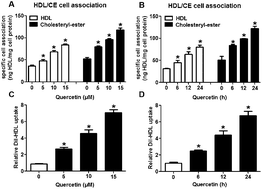当前位置:
X-MOL 学术
›
Food Funct.
›
论文详情
Our official English website, www.x-mol.net, welcomes your
feedback! (Note: you will need to create a separate account there.)
Quercetin induces the selective uptake of HDL-cholesterol via promoting SR-BI expression and the activation of the PPARγ/LXRα pathway†
Food & Function ( IF 5.1 ) Pub Date : 2017-12-08 00:00:00 , DOI: 10.1039/c7fo01107e Kun Ren 1, 2, 3, 4, 5 , Ting Jiang 1, 2, 3, 4 , Guo-Jun Zhao 1, 2, 3, 4
Food & Function ( IF 5.1 ) Pub Date : 2017-12-08 00:00:00 , DOI: 10.1039/c7fo01107e Kun Ren 1, 2, 3, 4, 5 , Ting Jiang 1, 2, 3, 4 , Guo-Jun Zhao 1, 2, 3, 4
Affiliation

|
Reverse cholesterol transport (RCT) is the process to deliver cholesterol to the liver for further excretion and involves scavenger receptor class B type I (SR-BI)-mediated selective lipid uptake (SLU) from high-density lipoprotein cholesterol (HDL-C). The up-regulation of hepatic SR-BI expression accelerates HDL-C clearance in circulation and impedes the development of atherosclerosis (AS). In the present study, we explored the modulation of hepatic SR-BI expression and SR-BI-mediated SLU by quercetin, a natural flavonoid compound in the diet with a favorable role in cardiovascular disorders. We found that quercetin significantly increased the expression level of SR-BI in HepG2 cells in a concentration- and time-dependent manner. Besides, quercetin had stimulatory effects on the binding of 1,1′-dioctadecyl-3,3,3′,3′-tetramethylindocarbocyanine perchlorate (Dil)-labeled HDL to hepatocytes and 125I/3H-CE-HDL association. Treatment with small interfering RNA (siRNA) or SR-BI specific inhibitor, BLT-1, inhibited quercetin-induced Dil-HDL binding and selective HDL-C uptake. Treatment with quercetin increased both proliferator-activated receptor γ (PPARγ) and liver X receptor α (LXRα) levels. Additionally, the quercetin-induced expression of SR-BI, Dil-HDL binding and the selective uptake of HDL-C were significantly attenuated by treatment with PPARγ siRNA, LXRα siRNA, and their antagonists, respectively. In C57BL/6 mice, quercetin administration potently increased SR-BI, PPARγ and LXRα levels and lipid accumulation in the liver. Altogether, our results suggest that quercetin-induced up-regulation of SR-BI and subsequent lipid uptake in hepatocytes might contribute to its beneficial effects on cholesterol homeostasis and atherogenesis.
中文翻译:

槲皮素通过促进SR-BI表达和PPARγ/LXRα途径的激活来诱导HDL-胆固醇的选择性摄取†
胆固醇逆向转运(RCT)是将胆固醇转运到肝脏进一步排泄的过程,涉及从高密度脂蛋白胆固醇(HDL-C)清除I类清道夫受体B(SR-BI)介导的选择性脂质摄取(SLU)。 。肝SR-BI表达的上调可加速循环中HDL-C的清除,并阻碍动脉粥样硬化(AS)的发展。在本研究中,我们探索了槲皮素对肝脏SR-BI表达和SR-BI介导的SLU的调节作用,槲皮素是饮食中的天然类黄酮化合物,对心血管疾病具有良好的作用。我们发现槲皮素以浓度和时间依赖性方式显着增加了HepG2细胞中SR-BI的表达水平。此外,槲皮素对1,1'-dioctadecyl-3,3,3'的结合具有刺激作用,125 I / 3H-CE-HDL关联。用小干扰RNA(siRNA)或SR-BI特异性抑制剂BLT-1治疗抑制槲皮素诱导的Dil-HDL结合并选择性吸收HDL-C。槲皮素治疗可同时增加增殖物激活受体γ(PPARγ)和肝X受体α(LXRα)的水平。此外,分别用PPARγsiRNA,LXRαsiRNA及其拮抗剂处理,槲皮素诱导的SR-BI表达,Dil-HDL结合和HDL-C的选择性摄取显着减弱。在C57BL / 6小鼠中,槲皮素给药可有效增加SR-BI,PPARγ和LXRα水平以及肝脏中的脂质蓄积。总之,我们的结果表明槲皮素诱导的SR-BI上调以及随后肝细胞中脂质的摄取可能有助于其对胆固醇稳态和动脉粥样硬化的有益作用。
更新日期:2017-12-08
中文翻译:

槲皮素通过促进SR-BI表达和PPARγ/LXRα途径的激活来诱导HDL-胆固醇的选择性摄取†
胆固醇逆向转运(RCT)是将胆固醇转运到肝脏进一步排泄的过程,涉及从高密度脂蛋白胆固醇(HDL-C)清除I类清道夫受体B(SR-BI)介导的选择性脂质摄取(SLU)。 。肝SR-BI表达的上调可加速循环中HDL-C的清除,并阻碍动脉粥样硬化(AS)的发展。在本研究中,我们探索了槲皮素对肝脏SR-BI表达和SR-BI介导的SLU的调节作用,槲皮素是饮食中的天然类黄酮化合物,对心血管疾病具有良好的作用。我们发现槲皮素以浓度和时间依赖性方式显着增加了HepG2细胞中SR-BI的表达水平。此外,槲皮素对1,1'-dioctadecyl-3,3,3'的结合具有刺激作用,125 I / 3H-CE-HDL关联。用小干扰RNA(siRNA)或SR-BI特异性抑制剂BLT-1治疗抑制槲皮素诱导的Dil-HDL结合并选择性吸收HDL-C。槲皮素治疗可同时增加增殖物激活受体γ(PPARγ)和肝X受体α(LXRα)的水平。此外,分别用PPARγsiRNA,LXRαsiRNA及其拮抗剂处理,槲皮素诱导的SR-BI表达,Dil-HDL结合和HDL-C的选择性摄取显着减弱。在C57BL / 6小鼠中,槲皮素给药可有效增加SR-BI,PPARγ和LXRα水平以及肝脏中的脂质蓄积。总之,我们的结果表明槲皮素诱导的SR-BI上调以及随后肝细胞中脂质的摄取可能有助于其对胆固醇稳态和动脉粥样硬化的有益作用。











































 京公网安备 11010802027423号
京公网安备 11010802027423号